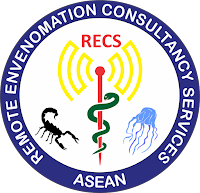Remote Envenomation Consultancy Services

Remote Envenomation Consultancy Services RECS is a risk management support system. RECS was strategically developed to assist healthcare professionals at various levels of clinical management for bites/stings envenoming from venomous animals and poisoning from naturally occurring toxins. Remote Envenomation Consultancy Services is a 24hr ‘on-call’ consultation service and training provider, mainly but not exclusively, for healthcare professionals since 2010. This unique service was officially established in early 2012. RECS originated in Malaysia and was initially made up of Emergency Physicians and members of MST with a special interest in Clinical Toxinology. The efforts of RECS has made a huge impact in patient's care, and is recognized and supported by Ministry of Health and the Toxinology Societes in ASEAN countries. The main objective of RECS is to enhance a favorable outcome by optimizing and advocating appropriate treatment modalities at every level of clinical management.


The requirements are:
- Graduated as a medical specialist (Masters Degree or higher)
- Successfully completed a list of related courses and academic programs, symposiums, or conferences:
- First Aid Course for Snakebites (FACS)
- First Aid for Marine Envenoming course (FAME)
- Snakebite Envenoming Management course (SEM)
- Marine Envenoming & Poisoning course (MEP)
- Arthropods Bites & Stings course (ABS)
- Mushroom Poisoning Management course (MPM)
- Short Course on Clinical Toxinology (by IST)
- Clinical Toxinology Symposium (TOXINORT)
- ASEAN Marine Animals & Snake Envenoming Management Symposium (AMSEM)
- TOXED Symposium & Workshop on Teleconsultation for Clinical Toxinology (TCT)
- ASEAN Clinical Toxinology Conference (ACT)
- Regional Toxinology Related Conferences or IST World Congress (optional)
- Active Membership of:
- College of Emergency Physician Special Interest Group on Clinical Toxinology (or equivalent)
- Any of the Toxinology Societies in ASEAN countries (MST, TSI, PhiTonS Inc., etc.)
- International Society on Toxinology (IST) (optional)
The RECS ASEAN Council was formed on the 7th February 2020 following the 1st Standardisation Workshop of RECS Educational Programs in Langkawi, Malaysia. RECS ASEAN becomes the platform for the development of the ASEAN Fellowship of Clinical Toxinology (AFCT) program. In the near future, all RECS Consultants are fellows of AFCT.
What is RECS?
Remote Envenomation Consultancy Services (RECS) refers to specialized medical and advisory services that provide expertise on the management of venomous bites or stings, often from a distance. This can include consultations via telemedicine platforms where healthcare professionals, such as toxicologists or emergency physicians, advise on the appropriate treatment and management of envenomations.
Key aspects of RECS may include:
- Expertise: The service is staffed by professionals with specialized knowledge in toxinology, including toxicologists and emergency medicine specialists.
- Telemedicine Support: Physicians can guide local healthcare providers in real time about the best practices for treating venomous bites or stings.
- Assessment and Diagnosis: Experts may help assess the severity of the envenomation and recommend whether patients need antivenom, supportive care, or other interventions.
- Education: RECS often provide training and resources for healthcare workers in regions prone to venomous wildlife encounters, enhancing their ability to respond effectively.
- Data Collection and Research: These services may also involve gathering data on envenomation cases to improve treatment protocols and understanding of venomous species.
- Emergency Response Planning: RECS can assist organizations in developing protocols for dealing with envenomation incidents, especially in high-risk areas.
- Collaboration: RECS fosters collaboration between local healthcare providers and toxinology experts, ensuring that care is contextually relevant and informed by the latest research and best practices.
Overall, RECS is a risk management system that enhances the capability of local healthcare providers to effectively manage envenomation cases.
How Does RECS Operate?
Remote Envenomation Consultancy Services (RECS) operates through a structured process designed to provide timely and effective support for managing venomous animals’ bites and stings. Here’s an overview of how RECS typically operates:
- Consultation Request: Healthcare providers encountering a suspected envenomation case can initiate a consultation request, often through a telemedicine platform or direct communication.
- Assessment: The RECS team, consisting of experts such as clinical toxinologists, toxicologists, and emergency physicians, assesses the situation. They may ask for details about the patient’s symptoms, the type of envenomation, and any available medical history.
- Guidance and Recommendations: Based on the assessment, the RECS team provides real-time advice on the appropriate management steps. This may include recommendations for antivenom administration, supportive care, or referral to a higher-level medical facility.
- Follow-Up: RECS may offer follow-up consultations to monitor the patient’s progress and adjust treatment recommendations as needed.
- Education and Training: In addition to direct consultations, RECS often engages in training healthcare providers to recognize and manage envenomations effectively, enhancing local capacities.
- Data Collection: RECS may also collect data on envenomation cases to inform future practices and improve the understanding of venomous species in the region.
This operational model helps ensure that healthcare workers, especially in remote or resource-limited areas, have access to expert advice, ultimately improving patient outcomes in cases of envenomation.
What are the Educational Programs Conducted by RECS?
Remote Envenomation Consultancy Services (RECS) conducts various educational programs aimed at enhancing the knowledge and skills of healthcare providers in managing venomous bites and stings. These programs typically include:
- Workshops and Training Sessions: RECS organizes hands-on workshops that focus on the recognition, assessment, and management of envenomations. These sessions often include simulations and practical exercises.
- Webinars: Online seminars are held to reach a wider audience, allowing healthcare professionals to learn about the latest research, treatment protocols, and best practices in toxinology and envenomation management.
- Educational Resources: RECS provides access to guidelines, manuals, and other educational materials that detail the management of different types of envenomations, including specific protocols for various venomous species.
- Collaboration with Local Institutions: RECS often collaborates with medical schools, hospitals, and health organizations to integrate envenomation management training into their curricula or continuing education programs.
- Case Studies and Discussions: Educational programs may include case study reviews, allowing participants to analyze real scenarios, discuss challenges, and share experiences related to envenomations.
- Field Training: In certain cases, RECS may conduct field training in areas where venomous encounters are common to train local healthcare workers in situ.
These programs aim to empower healthcare providers with the knowledge and skills necessary to effectively manage envenomation cases, ultimately improving patient care in regions where venomous species are prevalent.
Are RECS Services Recognized and Acknowledged?
Remote Envenomation Consultancy Services (RECS) is recognized in Malaysia and has gained acknowledgement in other countries, particularly within the ASEAN region. Its services are valued for providing expert guidance on managing venomous animals’ bites and stings effectively, which is critical in areas where encounters with venomous species are common.
Key Points of Recognition Include:
- Local Recognition: RECS is endorsed by the Ministry of Health, Malaysian Society on Toxinology (MST), and has established collaborations with local healthcare institutions and organizations.
- International Collaboration: RECS may collaborate with other toxinology experts and institutions in the ASEAN region, enhancing its credibility and reach.
- Educational Impact: The training and resources provided by RECS contribute to improving healthcare practices related to envenomation management, which further solidifies its reputation.
- Research and Data: By collecting and analyzing data on envenomations, RECS contributes to the broader understanding of venomous species and their management, making its services relevant in research and clinical settings.
Key Points of Acknowledgement Include:
- Professional Endorsement: RECS is endorsed by organizations such as the Malaysian Society on Toxinology (MST), which lends credibility to its operations and expertise.
- Healthcare Integration: Many healthcare facilities and professionals in Malaysia and neighboring countries recognize and utilize RECS for guidance on envenomation management, reflecting its practical utility in clinical settings.
- Educational Contributions: RECS's training programs and resources are acknowledged for enhancing the capacity of healthcare providers to deal with venomous animal encounters, further solidifying its reputation.
- Research Collaboration: RECS's involvement in data collection and research on envenomations contributes to the broader field of toxinology, making its services relevant beyond just immediate clinical care.
RECS is recognized and acknowledged as a crucial resource for improving the management of envenomations and enhancing patient outcomes in regions where such incidents are prevalent.







